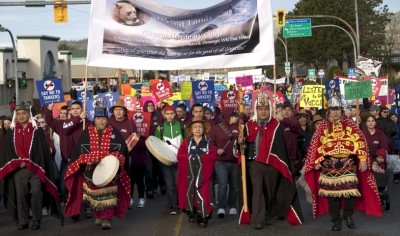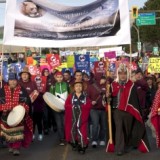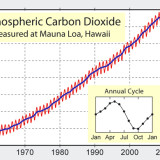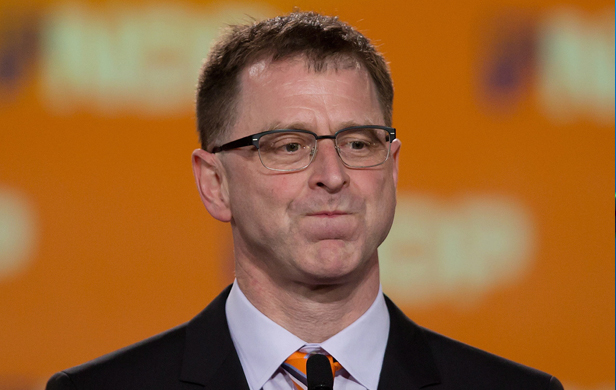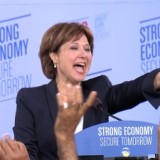BC NDP Leader Adrian Dix issued a statement Tuesday, offering an explanation and form of apology for the surprise provincial election loss he presided over recently. In the letter, published below, he accepts responsibility for the loss, acknowledging a common criticism of the campaign – levied often in these pages – that he wasn’t tough enough on his Liberal opponents. “We did not do a good job prosecuting the case against the government, based on their record,” Dix admits. And yet, he appears to remain committed to the “nice guy” approach that to many observers was his undoing: “I don’t believe last week’s results are the end of ‘positive politics’ in BC.”
Dix also addresses his surprise opposition to the proposed Kinder Morgan pipeline and oil tanker expansion, claiming it was not the policy but the manner in which he unveiled it that hurt the campaign. “I hold to the policy I set out on that pipeline. But, plainly, I didn’t handle that issue very well,” says Dix.
On this score, he is correct, as I discussed in my post-election analysis of the NDP’s failed campaign.
But in his post-mortem, Dix shows that he still doesn’t recognize the specific failures he committed in framing these issues within an economic context. As I have argued before, the several dozen permanent jobs offered by Kinder Morgan’s expanded tanker terminal pale in comparison to the risks it poses to our $13.4 Billion tourism economy and the “Super, Natural BC” brand upon which it is based.
Even more baffling is Dix’s failure to destroy the Liberals’ perceived economic advantage – the single plank upon which they based and won their campaign. The great, lingering mystery for me is the NDP’s failure to use the numbers Auditor General John Doyle and our resident economist Erik Andersen have provided the public on our real provincial debt, which has ballooned to $171 Billion from $34 Billion under the Liberals’ tenure. Why the NDP chose to ignore this fodder on the principal issue of the election is positively baffling – and Mr. Dix appears to have learned nothing from his mistakes on this front.
The statement below was followed on Wednesday by the revelation that Mr. Dix plans to stay on as the party’s leader, promising a full review of his election loss. Based on these initial reflections on the failed campaign, I’m not holding my breath for any enlightened discoveries from this review.
Dix faces an automatic leadership review at the party’s next convention in November. Pundits within the party, such as David Shrek, are already predicting that Dix will not survive as leader into the next election in 2017. Not should he. He has already amply demonstrated that he is wholly unsuited to beat his Liberal rivals and remains committed to his losing “Mr. Nice Guy” strategy.
“If you look at the history of the NDP, it doesn’t tolerate people who blow a 20-point lead. Leaders in the NDP are not given a second chance,”says former MLA and NDP media commentator Shrek. “(Dix is) a political realist. The only ball in the air is whether he will be the interim leader until the 2016 replacement, or whether somebody else will be.”
Adrian Dix’s complete May 22 statement:
Shortly before the election we’ve just had, I met a hearing-impaired young man.
He stopped me, asked for my notebook and wrote me a note. “Are you going to win?” he asked.
I wrote back: “I think we can, if we work hard.”
He wrote me back: “You have to win.” And proceeded to write out why it was so important to him.
We didn’t win. And “disappointment” doesn’t begin to describe how that feels.
Disappointment for the people who needed change, like that young man.
Disappointment for what this may mean for our province.
Disappointment for so many who put their heart and soul into our campaign.
Since May 14th, I have taken some time to reflect, and to consult with my colleagues.
I have spoken to most of our candidates and to many others.
Here are some thoughts:
As leader of the BC NDP, I take full responsibility for this defeat.
Clearly, our campaign was not good enough.
We did not do a good job prosecuting the case against the government, based on their record.
And we did not make a clear enough case to British Columbians about what the consequences would be of re-electing the Liberals.
I don’t believe last week’s results are the end of “positive politics” in BC.
The answer to the Liberals’ populist right-wing playbook is not to simply adopt it.
But voters expect opposition leaders, in particular, to hold sitting Premiers accountable for their records.
You have to define the problem before you can persuade people of the solution.
I should have done a much better job of this than I did during the campaign.
Second, we did not effectively communicate our platform to voters.
Our party offered a substantive, fully-costed platform that offered real solutions to real problems faced by British Columbians.
I called this the “hard road to victory”—and I still believe politicians owe it to voters to tell them honestly what they propose to do if elected.
We committed to a modest and focused agenda. But we put out detailed proposals in considerable volume and length in a way that didn’t resonate with enough voters.
We therefore failed to demonstrate a clear choice between our vision for the economy, the environment and a more caring society, and Premier Clark, her record, her plan and her team.
Finally, my announcement about our position on the Kinder Morgan pipeline on Earth Day hurt our campaign.
The way I made it raised a number of process issues that stuck with us.
I hold to the policy I set out on that pipeline.
But, plainly, I didn’t handle that issue very well.
On all these points, I take full responsibility. No ifs, ands or buts.
So what do we do now?
First, we will undertake a comprehensive review of this election, to learn and act on the painful lessons it has taught us.
I can assure you this review will spare nothing and no one, least of all me.
This will not be a simple internal review.
It must give voice to party members, and listen to those from outside our ranks.
It must address the strategy and tactics we employed in the election. And it must examine the fundamental questions of who we are as a party, and our relationship with the people of BC.
We therefore need to take an unflinching look at our strengths and weaknesses, and what we need to do to improve.
Successful political parties constantly evolve to meet the challenges they face.
And that’s what we must do.
Second, we will prepare for the upcoming legislative session and we will do the job we were elected to do.
The NDP caucus is a strong, experienced team with some remarkable new additions.
We will hold the government to account.
The Liberals committed in this election to balanced budgets, to lower public debt, to high levels of job creation, and to protecting services—in particular health care and education, and supports for seniors and for children.
That’s the contract they signed with British Columbians on election day.
And that’s the contract they must honour.
We will hold them to it – with passion. British Columbians will hold them to it.
I will stay on as leader to ensure that our obligations to our members and the public are met over the next few months.
That our review of what went wrong in the election ensures that lessons are learned.
That the Official Opposition does the job that hundreds of thousands of British Columbians elected us to do, and that we are organized to hold the government to account.
There are some important meetings ahead for our party: caucus meetings, a provincial council meeting in June, and a party convention in November that must craft the blueprint for renewal.
As for the long term, the caucus, the party executive and members of the NDP must start immediately to map out how we win the next election.
I will do whatever is required to see that this happens. I will be guided by the discussion and direction given.
I will put the public interest and the long-term success of the BC NDP ahead of any personal ambitions.
For now, together, we fight for shared prosperity, to reduce inequality, for jobs and a safe environment.
Working closely and in concert with our entire team, I will do just that.
I will do what is right for that young hearing-impaired man and the thousands like him who were counting on us.
Lastly, I want to say a few words of thanks.
To all the candidates who put their heart and soul into this election.
To all the party members and volunteers who worked so hard and gave up so much on the campaign, whether for an individual candidate or for the campaign as a whole.
And to every one of the hundreds of thousands of British Columbians who voted for us.
We will carry on.
We will learn and get better.
And we will succeed next time.
Thank you.
